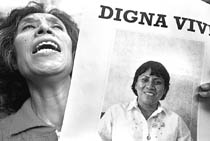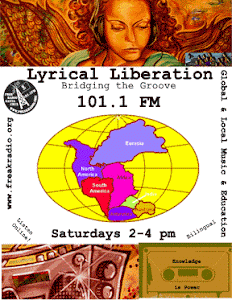
MEDIA ADVISORY Immediate Release: 19 December 2007
lakotafree@gmail.com Freedom!

###
Saturdays 2-4pm *101.1 FM* Free Radio Santa Cruz. www.freakradio.org



Compañeros and compañeras of Mexico and the world. Good evening to all of you. With this Second Encounter of the Zapatista Peoples with the Peoples of the World we are very energized, with much responsibility and this worries us greatly. It makes us think. How there is much that we would like to say in this encuentro but scarcely find the time to share what we Zapatista communities are doing and there remain things for us to share, especially us women Zapatistas. Because of this we wish to say with anticipation that these words will remain well-guarded by us while you go to inform our compañeros y compañeras in your communities of what you have already come and heard so that the rest who are not here can be informed.
But we think it’s better at once that you already bring the message from us women Zapatistas that we convoke the Third Encounter of the Zapatista Peoples with the Peoples of the World, and the principle and unique theme will be the women Zapatistas, especially for us women Zapatistas of the Zapatista communities to gather with compañeras from México and the world.
We are going to speak, us women Zapatistas, with compañeras from Mexico and the world and you will be able to ask questions of how we organize ourselves, the women Zapatistas, more directly with women. We are going to ask the compañeros men Zapatistas that they help us with logistical questions. Compañeros from Mexico and the world may also come to hear us, but remain silent [calladitos], same as our compañeros men Zapatistas.
This Third Encuentro, as it will be especially of the women Zapatistas, will be dedicated to Comandanta Ramona, and will take her name. Thus it is like this: Third Encuentro of the Zapatista Peoples with the Peoples of the World: Comandanta Ramona and the women Zapatistas.
Bring this message to the rest of the compañeras. That they are prepared. At the same time, that they go to tell their spouses that they will have to take care of the house, the kids, and pets for a few days, while they leave and gather with the women Zapatistas to organize ourselves on how to fight against capitalism and neoliberalism.
This Third Encuentro of the women Zapatistas we think will happen around the last days of December 2007. We are consulting with the compañeras and compañeros of the Good Government Council of the caracol of La Garrucha and the community of La Garrucha, which is the seat of the caracol, if they will permit us to have our Third Encuentro there.
We’ll confirm later. We ask that you watch our Zezta Internazional and Enlace Zapatista internet pages, the Intergalactic Commission of the Sixth Commission of the Other Campaign.
The days we are thinking of:
Arrive the day of December 28 in the Caracol of La Garrucha and register;
December 29, 30, 31: plenary workshops of the Zapatista women with time for questions from the women of the world,
January 1: Celebration of our 14th anniversary of the beginning of the uprising of these dignified lands.
This is the invitation, compañeros y compañeras. We will be waiting here as always by the doors.
http://zeztainternazional.ezln.org.mx/?p=18
www.ezln.org.mx

Comandanta Ramona, 1959-2006
In 1993, Comandanta Ramona, together with Major Ana María, extensively consulted indigenous Zapatista communities (back then, still underground and not public) about the exploitation of women and subsequently penned the Revolutionary Laws of Women. On March 8 of that year, the Revolutionary Laws were passed.
Ramona was a woman charged with significant responsibilities, such as having been entrusted with the military leadership in San Cristóbal during the uprising in 1994. In February of that year and after the Zapatistas called a cease-fire to the twelve-day long uprising in response to mass peace marches, Ramona was the first Zapatista representative to speak during peace talks with the government. Two years later, when the Mexican authorities forbade the Zapatistas from participating in the National Indigenous Congress in Mexico City, the frail and ill-struck Ramona was asked to represent the Zapatistas. The plan worked as the government conceded to Ramona and she went on to represent the Zapatistas, speaking in front of 100,000 supporters in Mexico City’s Zocalo during the important nation-wide indigenous gathering.
The Mexican government, baffled by the popularity of a poor indigenous woman, made numerous attempts to undermine her influence. In 1997, it went so far as to state that the rebel leader had died and when she made public appearances that proved otherwise, authorities accused the Zapatistas of having used a “double.”
Comandanta Ramona passed on January 6th, 2006, after a decade-long bout with cancer of the kidney. Ramona's death is reflective of a health care crisis that the impoverished indigenous communities of Chiapas continue to suffer from. In the highlands of the southeastern Mexican state, where most of Chiapas’ indigenous residents live, there are no hospitals. The state government has promised for years to build a hospital in San Andrés Larráinzar (the same town that peace accords between the Zapatistas and the Mexican federal government were signed in 1996 but never implemented). However, the promise to build such a hospital has not been acted upon and Chiapas continues to lack crucial health care resources in its remote regions. Only in San Cristóbal, which is anywhere between two and twelve hours away from most indigenous communities, can women access preventative studies that could save the lives of women with early detections of cancer. In addition to the lack of hospitals, medical costs are often prohibitive to many of Chiapas’s poor and infirm.
Choking back tears, Subcomandante Marcos made the public announcement of Ramona’s death in the midst of the Chiapas segment of the nationwide six month Zapatista led “Other Campaign.”“I want everybody to listen to what I am about to say without any interruptions. Comandanta Ramona died yesterday… The world has lost one of those women it requires. Mexico has lost one of the combative women it needs and we, we have lost a piece of our heart.”




Digna Ochoa ( 1964-2001)
On October 19th, 2001, Digna Ochoa, a leading Mexican human rights lawyer, was found shot dead in her office in Mexico City.
Digna Ochoa had taken on some of Mexico's most controversial cases,including the defense of Rodolfo Montiel and Teodoro Cabrera, anti-logging environmentalists in the state of Guerrerro, Zapatistas guerrillas in Chiapas and the rights of indigenous communities in her home state of Verazcruz. At the time of her death, she was defending three men charged with bombing banks in Mexico City to protest against globalization.
In August 1999, after she began work on the Montiel and Cabrera case, Digna Ochoa was kidnapped and beaten by two unidentified men before being set free with the warning that she would be killed if she drew attention to the abduction.
In September 1999, three death threats were received at her office. Attached to one letter was one of Digna Ochoa's business cards that had been taken from her during her abduction. Then in October,1999, on the same night that the offices of her agency, PRODH, were ransacked and files destroyed, three men broke into her home. They tied her to a chair, immobilized her arms and legs, and locked Digna in a room with an open gas canister, and left her to die. Miraculously, once again, she was able to free herself.
But the determination of her persecutors finally prevailed. On 19 October, 2001, Digna Ochoa's body was found in a legal office in Mexico City. The killers left a death threat warning other human rights defenders from the PRODH, that they would meet a similar fate, if they continued their human rights work.
The murder of Digna Ochoa sent shock waves through Mexican society. President Fox's administration, which came to power after over 70 years of one-party rule, had pledged to end impunity and radically improve Mexico's human rights situation. Digna Ochoa's murder demonstrates that the authorities have failed to deliver real improvements.
In july 2003 despite overwhelming evidence and a note beside her body addressed to other " sons-of bitch " human rights lawyers, the Mexican government ruled Digna Ochoa's violent deatha "probable suicide" and slammed the case shut.


